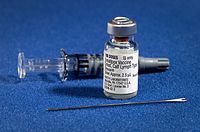
Photo from wikipedia
Yersinia pestis, the causative agent of plague, has killed millions throughout human history. Though public health initiatives have reduced the number of plague cases, it remains endemic in many areas… Click to show full abstract
Yersinia pestis, the causative agent of plague, has killed millions throughout human history. Though public health initiatives have reduced the number of plague cases, it remains endemic in many areas of the world. It also remains a significant threat for use as a biological weapon. Naturally occurring multi-drug antibiotic resistance has been observed in Y. pestis, and resistant strains have been engineered for use as a biological weapon. Vaccines represent our best means of protection against the threat of antibiotic resistant plague. We have developed a vaccine consisting of two Y. pestis virulence factors, LcrV (V) and F1, conjugated to Tobacco Mosaic Virus (TMV), a safe, non-replicating plant virus that can be administered mucosally, providing complete protection against pneumonic plague, the deadliest form of the disease and the one most likely to be seen in a biological attack. A single intranasal (i.n.) dose of TMV-F1 + TMV-V (TMV-F1/V) protected 88% of mice against lethal challenge with 100 LD50 of Y. pestis CO92pgm-, while immunization with rF1 + rV without TMV was not protective. Serum and tissues were collected at various timepoints after challenge to assess bacterial clearance, histopathology, cytokine production, and antibody production. Overall, TMV-F1/V immunized mice showed a significant reduction in histopathology, bacterial burden, and inflammatory cytokine production following challenge compared to rF1 + rV vaccinated and unvaccinated mice. Pneumonic challenge resulted in systemic dissemination of the bacteria in all groups, but only TMV-F1/V immunized mice rapidly cleared bacteria from the spleen and liver. There was a direct correlation between pre-challenge serum F1 titers and recovery in all immunized mice, strongly suggesting a role for antibody in the neutralization and/or opsonization of Y. pestis in this model. Mucosal administration of a single dose of a Y. pestis TMV-based subunit vaccine, without any additional adjuvant, can effectively protect mice from lethal infection.
Journal Title: Vaccine
Year Published: 2021
Link to full text (if available)
Share on Social Media: Sign Up to like & get
recommendations!